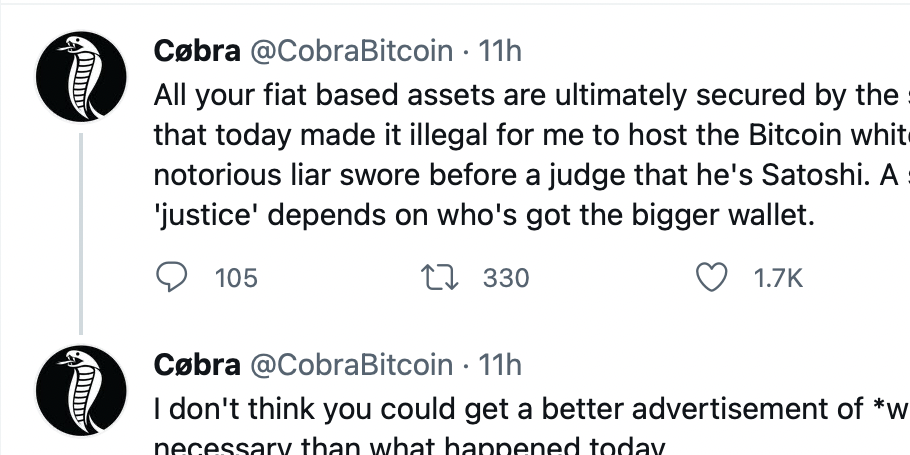
naruecha jenthaisong
- A UK court has told Bitcoin.org to stop sharing the bitcoin white paper, in a copyright ruling Monday.
- The judgment is a win for Craig Wright, the computer scientist who claims he wrote the document describing what bitcoin is.
- Bitcoin.org's anonymous founder, known only as Cobra, must pay $48,600 toward legal costs.
- Sign up here for our daily newsletter, 10 Things Before the Opening Bell.
A UK high court told Bitcoin.org it can no longer share the 2008 white paper that outlines what bitcoin is on its website, delivering a victory to Craig Wright, a computer scientist who claimed he wrote the original document.
Wright won the copyright-infringement case he brought by default, after the website's anonymous founder, known as Cobra, decided not to speak in his defense in the proceedings in London.
The ruling on Monday means Bitcoin.org must take the document down from its website. It must also pay Wright £35,ooo ($48,600) toward legal costs, as well as put a notice of the court's order on its website for six months, said Ontier, the law firm representing Wright.
"There may be further inquiry into copyright damages, but that is still to be determined. What will happen moving forward depends on what Craig Wright wants to do and if he is content with the court's decisions so far," an Ontier spokesperson told Insider.
"This is an important development in Dr Wright's quest to obtain judicial vindication of his copyright in his white paper," said Simon Cohen, a senior associate at London-based Ontier.
The creation of bitcoin has always been attributed to a person who goes by the alias "Satoshi Nakamoto." Nakamoto's identity is shrouded in mystery.
Bitcoin is the most widely traded cryptocurrency and its price is highly volatile. It has gained around 300% against the US dollar in the last 12 months and was trading around $36,000 on Tuesday.
Wright was granted permission to take the operator of Bitcoin.org to court in April, even though the defendant's name and address were unknown. The Australian computer scientist claimed to be the original author of the white paper that was published in 2008 and describes what bitcoin is and how it works.
Ontier said Wright took Cobra to court in order to prevent supporters of assets such as Bitcoin Core from using the white paper to mis-represent those assets as bitcoin. The high court proceedings were heard virtually, in pandemic style.
The judgement, thanks to Cobra, has played into the narrative that inspired the creation of bitcoin and other cryptocurrencies in the first place: that is, that centralized systems cannot be trusted. Concealment of identity has been an important theme in maintaining the decentralized-finance credibility of the crypto space, which is about peer-to-peer transfers that cut out any middleman.
"I didn't turn up because I didn't want to expose my identity," Cobra told Insider in a tweet.
"I am still awaiting to be served the judgement, so I will wait and see for now," Cobra said when asked what the next steps are.

Dit artikel is oorspronkelijk verschenen op z24.nl
